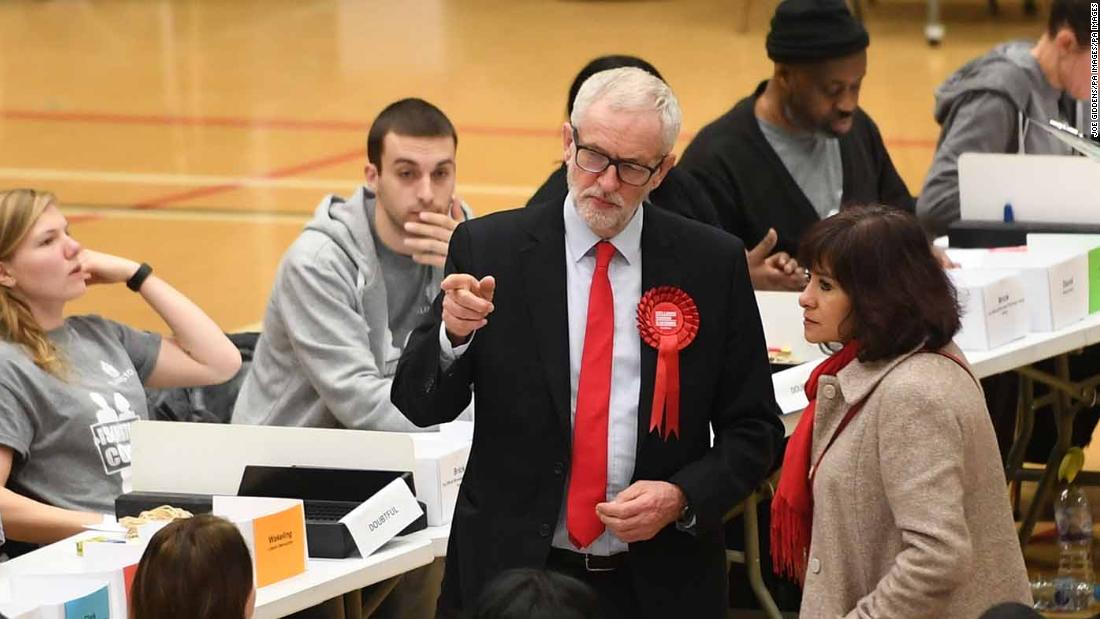
If the Labour Party's election night goes as disastrously as early exit polls foretell, the Democratic Party may see a cautionary tale for the US 2020 presidential race.
Labour's Jeremy Corbyn took his party way to the left, leaving the more moderate ground where many voters feel most comfortable, including some in his own party and outside. He promised revolutionary change, a fundamental overhaul of society, heavy new taxes on the rich and a far bigger role for the state in the economy. Sound familiar?
Debate has rocked the Democratic Party over whether candidates like Bernie Sanders and Elizabeth Warren are trekking too far to the left and leaving moderates behind. Both are promising an assault on billionaires and a state-run health caresystem -- a huge chunk of the US economy. Both also dismiss the idea that their political purity is a vote killer.
Granted, what's considered "left" in the US is closer to center in the UK (where the state-run health care is generally beloved), but the two great Western democracies often rumble with similar trends. After all, the 2016 Brexit referendum to leave the EU foreshadowed Trump's own anti-establishment revolt in the same year. No one saw either coming.
A Corbyn loss would give moderate US candidates like Pete Buttigieg and Joe Biden grist for their arguments that party rivals to their left would be a disaster facing Trump next November.
And while US Republicans are radically further right than the UK's Conservative Party, if Britons vote to keep in office their own yellow-haired, fast-talking populist -- a man estranged from the truth and contemptuous of the press -- well, what isn't there for Trump to love about that?
Meanwhile in London
Just two months ago, I hummed along to "God Save the Queen" in a wood-paneled city hall chamber in east London -- the last step in the process of transforming from an Arizona-born American into a British citizen.
On Thursday, mulling over a joking warning from colleagues not to vote "the American way," I exercised my new citizenship, trudging to a poll station in a cold rain to vote on perhaps the biggest decision in a generation, with radically different visions of the UK's future on offer.
There were a few things missing when I got there. Unlike in the US, there was no line, or "queue" (though if there had been one it would've been orderly, of course). I needed no ID, and no polling card -- simply gave my name and address and was handed a ballot paper. None of the six wooden voting booths had curtains.
Even the ballot was surprisingly spare; while American voters usually toil through a detailed questionnaire of candidates ranging from president all the way to local mining commissioner, the UK offered me one choice: Which party would represent me in Parliament for the next five years?
With Brexit looming over whichever government emerges, having a voice in this particular election means something more than good democratic participation. My overriding thought as I scrawled an X on the ballot, then dropped it in a sealed box, was how lucky I am to be allowed to stay and vote in this country, at a time when millions of others face an uncertain future.
Later, my vote would be hand-counted, in the old-fashioned way it's always done here.
--CNN's Nick Thompson writes for Meanwhile from London
Meanwhile in Brussels: 'It's not the way we divorce, it's what we build afterwards'
Diplomats and officials breathed a sigh of relief in Brussels as early exit polls suggested a Conservative win.
Contrary to the view of many "Remain" voters in the UK, the preliminary results of Britain's vote on Thursday are not going down badly with the people on the other side of Brexit.
While at a push, most EU leaders would prefer that the Brexit vote hadn't happened, further uncertainty was by far the worst outcome as far as they were concerned. They wanted clarity, and now they might have it.
As France's European affairs minister Amelie de Montchalin said, "What France has asked for for a long time is clarity. This result brings that."
The most important thing with Brexit, she added, is "not the way we divorce, it's what we build afterwards."
-- CNN's Luke McGee writes from London
No comments:
Post a Comment